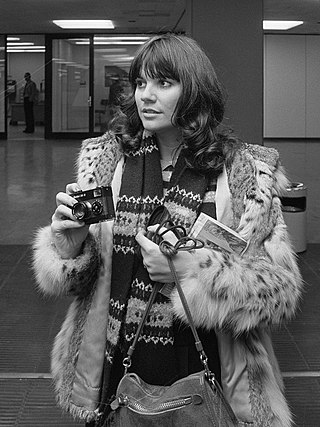
Linda Maria Ronstadt is an American singer who performed and recorded in diverse genres including rock, country, light opera, the Great American Songbook, and Latin music.

"That'll Be the Day" is a song written by Buddy Holly and Jerry Allison. It was first recorded by Buddy Holly and the Three Tunes in 1956 and was re-recorded in 1957 by Holly and his new band, the Crickets. The 1957 recording achieved widespread success. Holly's producer, Norman Petty, was credited as a co-writer, although he did not contribute to the composition.

James Edward Ingram was an American singer, songwriter and record producer. He was a two-time Grammy Award-winner and a two-time Academy Award nominee for Best Original Song. After beginning his career in 1973, Ingram charted eight top 40 hits on the U.S. Billboard Hot 100 chart from the early 1980s until the early 1990s, as well as thirteen top 40 hits on the Hot R&B/Hip-Hop Songs chart. In addition, he charted 20 hits on the Adult Contemporary chart. He had two number-one singles on the Hot 100: the first, a duet with fellow R&B artist Patti Austin, 1982's "Baby, Come to Me" topped the U.S. pop chart in 1983; "I Don't Have the Heart", which became his second number-one in 1990 was his only number-one as a solo artist.

An American Tail is a 1986 American animated musical adventure comedy-drama film directed by Don Bluth and written by Judy Freudberg and Tony Geiss from a story by David Kirschner, Freudberg and Geiss. The film stars the voices of Phillip Glasser, John Finnegan, Amy Green, Nehemiah Persoff, Dom DeLuise, and Christopher Plummer. It is the story of Fievel Mousekewitz and his family as they emigrate from Russia to the United States for freedom, but Fievel gets lost and must find a way to reunite with them.

"Blue Bayou" is a song written by Roy Orbison and Joe Melson. It was originally sung and recorded by Orbison, who had an international hit with his version in 1963. It later became Linda Ronstadt's signature song, with which she scored a Top 5 hit with her cover in 1977. Many others have since recorded the song.

"Mr. Sandman" is a popular song written by Pat Ballard and published in 1954. It was first recorded in May of that year by Vaughn Monroe & his orchestra and later that year by The Chordettes and the Four Aces. The song's lyrics convey a request to "Mr. Sandman" to "bring me a dream" – the traditional association of the folkloric figure. The pronoun used to refer to the desired dream is often changed depending on the sex of the singer or group performing the song, as the original sheet music publication, which includes male and female versions of the lyrics, intended.

Trio is a collaborative album by American singers Dolly Parton, Linda Ronstadt, and Emmylou Harris. It was released on March 2, 1987, by Warner Bros. Records. The album has platinum certification in the U.S. for sales of one million copies, and has total worldwide sales of approximately four million. A second collaborative album, Trio II, was released in 1999.
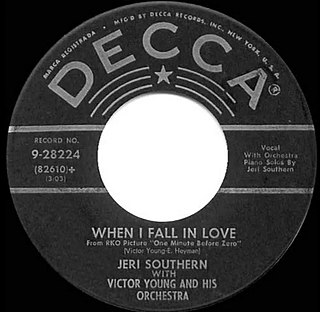
"When I Fall in Love" is a popular song, written by Victor Young (music) and Edward Heyman (lyrics). It was introduced in Howard Hughes' last film One Minute to Zero as the instrumental titled "Theme from One Minute to Zero". Jeri Southern sang on the first vocal recording released in April 1952 with the song's composer, Victor Young, handling the arranging and conducting duties. The song has become a standard, with many artists recording it; the first hit version was sung by Doris Day released in July 1952.

"Heat Wave" is a 1963 song written by the Holland–Dozier–Holland songwriting team. It was first made popular by the Motown vocal group Martha and the Vandellas. Released as a 45 rpm single on July 9, 1963, on the Motown subsidiary Gordy label, it hit number one on the Billboard Hot R&B chart—where it stayed for four weeks—and peaking at number 4 on the Billboard Hot 100.
"Don't Know Much" is a song written by Barry Mann, Cynthia Weil and Tom Snow. Mann was the first to record the song in 1980, gaining a minor chart hit in the US. The song was made famous when it was covered as a duet by Linda Ronstadt and Aaron Neville in 1989. Their version was a worldwide success, topping the Irish Singles Chart and reaching the top 10 in several territories.
"All My Life" is a hit song written by Karla Bonoff and originally performed by Bonoff on her album New World (1988).
"By the Time I Get to Phoenix" is a song written by Jimmy Webb. Originally recorded by Johnny Rivers in 1965, it was reinterpreted by American country music singer Glen Campbell on his album of the same name. Released on Capitol Records in 1967, Campbell's version topped RPM's Canada Country Tracks, reached number two on Billboard's Hot Country Singles chart, and won two awards at the 10th Annual Grammys. Broadcast Music, Inc. (BMI) named it the third most performed song from 1940 to 1990. The song was ranked number 20 on BMI's Top 100 Songs of the Century. Frank Sinatra called it "the greatest torch song ever written." It was No. 450 on Rolling Stone magazine's Top 500 Songs of All Time.
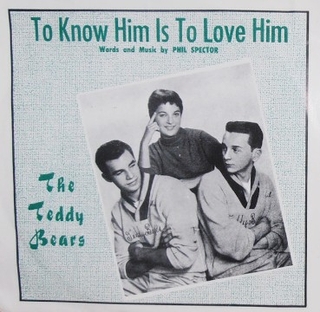
"To Know Him Is to Love Him" is a song written by Phil Spector, inspired by words on his father's tombstone, "To Know Him Was to Love Him." It was first recorded by the only vocal group of which he was a member, the Teddy Bears. Their recording spent three weeks at No. 1 on the Billboard Hot 100 chart in 1958, while reaching No. 2 on the UK's New Musical Express chart. Peter & Gordon and Bobby Vinton later had hits with the song, with its title and lyrics changed to "To Know You Is to Love You". In 1987, the song was resurrected by Dolly Parton, Linda Ronstadt, and Emmylou Harris, whose Trio recording topped the U.S. country singles chart.
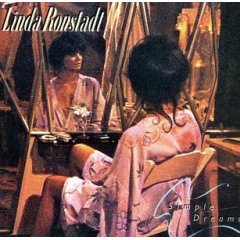
Simple Dreams is the eighth studio album by the American singer Linda Ronstadt, released in 1977 by Asylum Records. It includes several of her best-known songs, including her cover of the Rolling Stones song "Tumbling Dice" and her version of the Roy Orbison song "Blue Bayou", which earned her a Grammy nomination for Record of the Year. The album also contains covers of the Buddy Holly song "It's So Easy!" and the Warren Zevon songs "Poor Poor Pitiful Me" and "Carmelita". The album was the best-selling studio album of her career, and at the time was the second best-selling album by a female artist. It was her first album since Don't Cry Now without long-time musical collaborator Andrew Gold, though it features several of the other Laurel Canyon-based session musicians who appeared on her prior albums, including guitarists Dan Dugmore and Waddy Wachtel, bassist Kenny Edwards, and producer and multi-instrumentalist Peter Asher.

The singles discography of American singer Linda Ronstadt contains 80 lead and collaborative singles, four as a featured artist, eight promotional singles and eight other charted songs. Her first credited release was 1967's "Different Drum", which also included the Stone Poneys along with Ronstadt as a featured artist. Ronstadt's first pair of solo singles were released by Capitol Records in 1969. The 1970 release "Long, Long Time" was her first solo charting single. Her 1974 single "You're No Good" topped the US Hot 100, reached number seven in Canada and number 15 in Australia. Its B-side song "I Can't Help It " reached number two on the US Hot Country Songs list. It was followed by 1975's "When Will I Be Loved", which made the top ten on multiple charts in the United States and Canada, including topping their country surveys. It was followed by the US top five song "Heat Wave" and the US country top five song "Love Is a Rose".

"Everybody Plays the Fool" is a 1972 song first recorded by American R&B group The Main Ingredient, and written by J. R. Bailey, Rudy Clark and Ken Williams. It was the first single released from the group's album Bitter Sweet, released with the B-side "Who Can I Turn To ". "Everybody Plays the Fool" was the group's highest charting hit single, reaching No. 3 on the Billboard Hot 100 chart in the fall of 1972. It also peaked at No. 2 on the Billboard R&B chart and at No. 25 on the Billboard adult contemporary chart. It was certified gold by the RIAA.
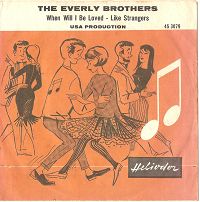
"When Will I Be Loved" is a popular song written by Phil Everly of the Everly Brothers, who had a US top-ten hit with it in 1960. Linda Ronstadt covered the song in 1975, and her version was an even bigger hit in the US, peaking at No. 2. Vince Gill also covered it in 1994 on the soundtrack of the film 8 Seconds.
An American Tail is a franchise based on the 1986 animated feature film of the same name directed by Don Bluth and produced by Sullivan Bluth Studios/Amblin Entertainment.

"Long, Long Time" is a song written by Gary White which became a hit for Linda Ronstadt in 1970. Ronstadt included the song on her album Silk Purse. "Long, Long Time" is about a lasting love for someone who never became a lover.

An American Tail: Fievel Goes West is the soundtrack and score album to the 1991 film An American Tail: Fievel Goes West. The animated Western comedy film, which was the first to be produced by Amblimation, an animation studio and subsidiary of Steven Spielberg's Amblin Entertainment, is the sequel to An American Tail (1986). James Horner who composed music for the first film, returned to score for Fievel Goes West, and also wrote four original songs with Will Jennings. The album featured four songs, with Linda Ronstadt and Cathy Cavadini performing the tracks. The original song "Dreams to Dream" received a nomination for Golden Globe Award for Best Original Song, and was shortlisted for the nomination of Academy Award for Best Original Song, but the track was not nominated.
















